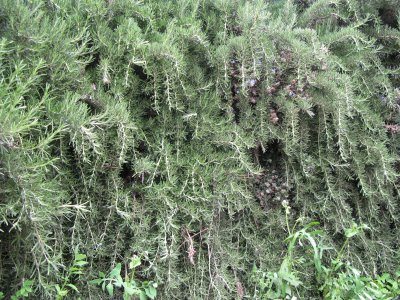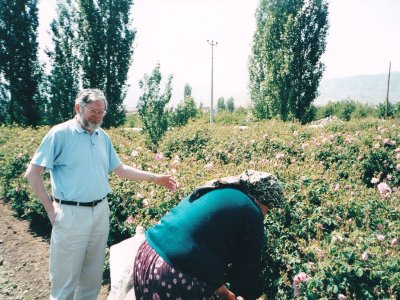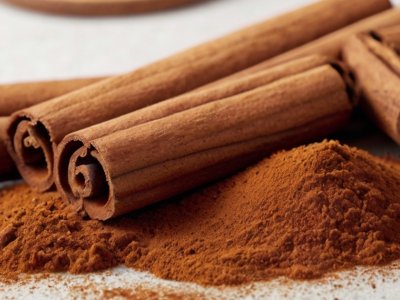Factors affecting Photosensitisation and Sensitisation
Safety, toxicity and related issues/
01.03.24

Factors affecting Photosensitisation and Sensitisation.
By Martin Watt
Introduction:There are a number of variables which need to be taken into account when considering which essential oils are safe to use on the skin. Obviously the first thing is the RIFM and other figures of maximum recommended volumes of essential oils to be used on the skin for different purposes. However, what standard figures often fail to take into account are the geographical, weather and other factors affecting how the skin responds to the application of aromatic extracts. See also: 'Examples' below.
Factors affecting potential photosensitisation and sensitisation are:
Higher than average UV light is of particular importance for those living at high altitudes where the intensity of UV light increases roughly 20% for each 3000 feet in elevation. This factor may not result in a problem with most essential oils. However, it certainly should be taken into account if using expressed bergamot, expressed lime, verbena and some of the lower potency photosensitising oils mentioned in my safety publications. It would seem sensible to avoid the application of any oils with the potential to cause photosensitisation in such circumstances. It would not be advisable to use these oils in preparations for use on exposed skin. Beauticians in particular need to take account of this by not using such oils in facials or in products unless only tiny volumes are used. People should never use a sunbed following a massage or facial using any essential oils, or even after the use of perfumes.
Higher than average temperature also comes into this equation. When skin tests are conducted on humans they are usually undertaken in dermatology clinics where it is not likely to be excessively hot. Anything which causes the skin pores to dilate will increase absorption of the substances applied. Obviously heat does that as does:-
Higher than average humidity. This is probably more of a concern than just high temperature because excessive humidity causes the pores to dilate a lot and excessive perspiration to occur. Having had personal experience of this factor I can tell you how uncomfortable the resulting irritation caused by sandalwood oil was. It is never wise to use essential oils in saunas or Turkish baths for this reason, plus of course the flammability problem with hot surfaces.
Genetic variations in skin types. This factor is known to affect how the immune system responds to certain essential oils. For example it is known that the Eastern races seem to have a predisposition to becoming sensitised to Ylang oil. The Scandinavian races have a higher incidence of reactions to pine-type oils. Unfortunately very little research seems to have been done on this problem and therefore only rough guidelines can be given: People with darker skin have an inbuilt sun protection factor which will reduce their incidence of photosensitisation. However despite that, it is known that expressed bergamot can still cause a problem with the darkest of skin. On the opposite end of the scale anyone with white thin skin is much more vulnerable to UV light damage and therefore essential oil photosensitisation.
So lets give some hypothetical scenarios:
1. You have a grandmother aged 85 who lives half way up a 1500 feet high hill but which is already on a plateau 3000 feet high. It is a very hot area with clear sky's most of the year. She has paper thin fragile skin on her hands and arms. She loves her garden and is always pottering about in the sun warming her old bones. She asks you if you could make her a cream for her dry hands and face. You think just a touch of expressed orange and lime oil would make it smell nice and fresh. When you did your course in aromatherapy you were told "you must only use whole unmodified oils and so never use anything which is not as nature intended". Granny uses the cream on her face and goes gardening on a sunny but humid day. Next thing is you get a call from her saying her skin is burning up what can she do? Well check your insurance policy perhaps - good job she is family!
2. Your husband regularly goes mountaineering around the world. He has a trip coming up which first means they have to trek through a bug infested humid forest before they get to the foot of the mountain. He asks you if you can make him a natural insect repellent. You have heard that citronella oil is good for this so you add 10 drops to a pot of sunprotecting cream and mix it in. He rubs some of the cream on his face, legs hands and arms before they leave camp for the jungle trek. You get a call on his mobile saying he has passed through the jungle and they are camping at the foot of the mountain. He says the bug cream worked just great and he didn't get any bites. A day passes - then two days - and you hear nothing. On the third day you get a call from his friend saying he was now in the local hospital with severely swollen and inflamed skin on his face legs and arms. He says the doctors can't figure out what is wrong because none of the others had this problem. He does wonder though if perhaps your husband skin was very sensitive to the sun as they stopped for a while on the glacier at 10,000 feet but the problem only started a day later. Is a divorce impending!!
Summary:If you are a trained aromatherapist or beautician you must not believe everything written in the aromatherapy books on safety issues. You owe it to your client to get better referenced information. If you are not trained never rely on what a shop assistant tells you about the oils they sell. There seems to be an increasing problem in the general population over skin sensitisation and it is no simple problem if you get this. It can lead to terribly disfiguring long lasting skin problems. Even so called "leading figures" in aromatherapy still to this day promote the use of oils with very well documented dangers, therefore never assume what you have been told is correct. Try and find ways to double-check any information you have been given on safety.Source and copyright:http://www.aromamedical.org/
BERGAMOT EXPRESSEDAND THE REACTIONS IT CAUSES.
Despite the well documented dangers, you will still find hundreds of aromatherapy oil suppliers saying nothing on their web sites about the significant harm that expressed bergamot oil can cause to the skin.
Case 1:
Dear Mr. Watt,You're obviously very knowledgeable on this topic, and I wonder if you could possibly spare a few minutes please, to tell me if there's anything topical I may use to counteract an extreme photosensitive reaction to Bergamot? I know virtually nothing about essential oils and on seeing them in my local chemist last week, I dabbed a little of the tester bottle of Bergamot on the sides of my neck, assuming it was just like ordinary perfume. The next day 2 very ugly dark brown patches showed up on my skin where I'd applied the Bergamot. (I'd been out gardening in the sunshine for the rest of the day.) The patches don't itch but a week later, there's still no sign of them fading.Please, Mr. Watt - in your expert opinion is there anything I can now do to reduce these unsightly blemishes? Answer NO!See next page for photos.Case 1:
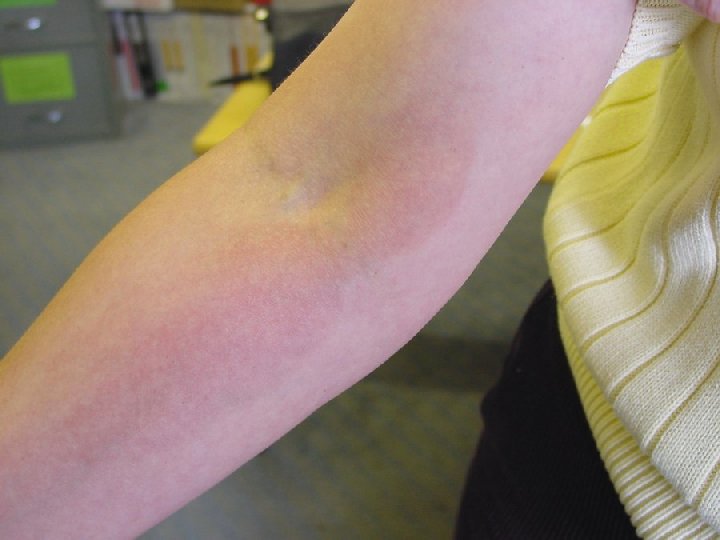
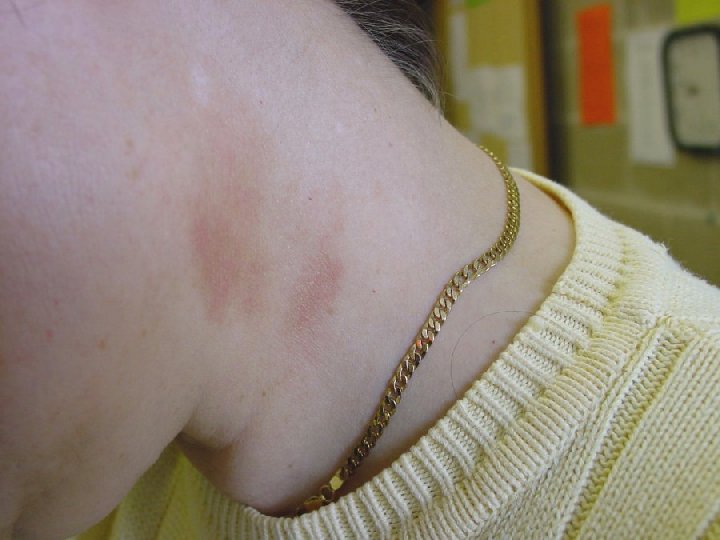
Case 2:My Note: The lady below was about 20 years old. Every time she goes into the sun for possibly years, she will get what looks like a love bite (hickey) on her neck. Can you imagine how any new partners will react until they know the cause. This is terribly damaging emotionally for her.
Her email: The essential oil manufacturer is........... my note, a very well known one in the USA. They have a website and it didn't say if it was FCF, "expressed" or otherwise. I emailed the manufacturer for more information on the product and mentioned my problem and they have not responded to me as yet (I think it's rude of them).
I regret to say that I applied the oil directly from the bottle with my right index finger and thumb. I don't, however, have any marks on my hands. The reaction on my lips was gone in 24 hours (by Sunday night). That was on the inside of my lips, and only really visible when I opened my mouth. It was painful until Sunday night. I think I essentially chewed it off throughout the course of the day.
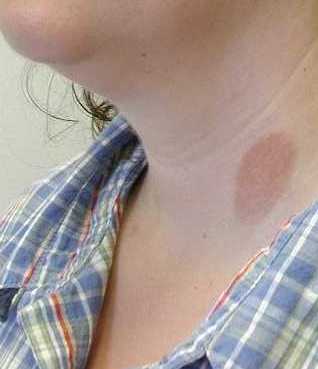
Again, please don't post my face on the web or in printed materials, but feel free to chop the picture and use the image of my neck as you'd like in your research. My marks are much more brown today. Yes, I am getting teased a lot for the "hiki" looking mark I am sporting on my neck. (I work with a lot of men....they're a bit juvenile...lots of laughing, one guy was impressed, even.).
FOR MORE INFORMATION USE BING.COM SEARCH AND FIND DERMATOLOGY WEB SITES USING THE TERMS 'PHOTOSENSITISATION'; 'PHOTOSENSITIZATION'; 'BERLOCK'; BERLOQUE DERMATITIS. THERE ARE MANY IMAGES ON THE WEB THAT I CAN'T REPRODUCE FOR COPYRIGHT REASONS.
By Martin Watt
Introduction:There are a number of variables which need to be taken into account when considering which essential oils are safe to use on the skin. Obviously the first thing is the RIFM and other figures of maximum recommended volumes of essential oils to be used on the skin for different purposes. However, what standard figures often fail to take into account are the geographical, weather and other factors affecting how the skin responds to the application of aromatic extracts. See also: 'Examples' below.
Factors affecting potential photosensitisation and sensitisation are:
Higher than average UV light is of particular importance for those living at high altitudes where the intensity of UV light increases roughly 20% for each 3000 feet in elevation. This factor may not result in a problem with most essential oils. However, it certainly should be taken into account if using expressed bergamot, expressed lime, verbena and some of the lower potency photosensitising oils mentioned in my safety publications. It would seem sensible to avoid the application of any oils with the potential to cause photosensitisation in such circumstances. It would not be advisable to use these oils in preparations for use on exposed skin. Beauticians in particular need to take account of this by not using such oils in facials or in products unless only tiny volumes are used. People should never use a sunbed following a massage or facial using any essential oils, or even after the use of perfumes.
Higher than average temperature also comes into this equation. When skin tests are conducted on humans they are usually undertaken in dermatology clinics where it is not likely to be excessively hot. Anything which causes the skin pores to dilate will increase absorption of the substances applied. Obviously heat does that as does:-
Higher than average humidity. This is probably more of a concern than just high temperature because excessive humidity causes the pores to dilate a lot and excessive perspiration to occur. Having had personal experience of this factor I can tell you how uncomfortable the resulting irritation caused by sandalwood oil was. It is never wise to use essential oils in saunas or Turkish baths for this reason, plus of course the flammability problem with hot surfaces.
Genetic variations in skin types. This factor is known to affect how the immune system responds to certain essential oils. For example it is known that the Eastern races seem to have a predisposition to becoming sensitised to Ylang oil. The Scandinavian races have a higher incidence of reactions to pine-type oils. Unfortunately very little research seems to have been done on this problem and therefore only rough guidelines can be given: People with darker skin have an inbuilt sun protection factor which will reduce their incidence of photosensitisation. However despite that, it is known that expressed bergamot can still cause a problem with the darkest of skin. On the opposite end of the scale anyone with white thin skin is much more vulnerable to UV light damage and therefore essential oil photosensitisation.
So lets give some hypothetical scenarios:
1. You have a grandmother aged 85 who lives half way up a 1500 feet high hill but which is already on a plateau 3000 feet high. It is a very hot area with clear sky's most of the year. She has paper thin fragile skin on her hands and arms. She loves her garden and is always pottering about in the sun warming her old bones. She asks you if you could make her a cream for her dry hands and face. You think just a touch of expressed orange and lime oil would make it smell nice and fresh. When you did your course in aromatherapy you were told "you must only use whole unmodified oils and so never use anything which is not as nature intended". Granny uses the cream on her face and goes gardening on a sunny but humid day. Next thing is you get a call from her saying her skin is burning up what can she do? Well check your insurance policy perhaps - good job she is family!
2. Your husband regularly goes mountaineering around the world. He has a trip coming up which first means they have to trek through a bug infested humid forest before they get to the foot of the mountain. He asks you if you can make him a natural insect repellent. You have heard that citronella oil is good for this so you add 10 drops to a pot of sunprotecting cream and mix it in. He rubs some of the cream on his face, legs hands and arms before they leave camp for the jungle trek. You get a call on his mobile saying he has passed through the jungle and they are camping at the foot of the mountain. He says the bug cream worked just great and he didn't get any bites. A day passes - then two days - and you hear nothing. On the third day you get a call from his friend saying he was now in the local hospital with severely swollen and inflamed skin on his face legs and arms. He says the doctors can't figure out what is wrong because none of the others had this problem. He does wonder though if perhaps your husband skin was very sensitive to the sun as they stopped for a while on the glacier at 10,000 feet but the problem only started a day later. Is a divorce impending!!
Summary:If you are a trained aromatherapist or beautician you must not believe everything written in the aromatherapy books on safety issues. You owe it to your client to get better referenced information. If you are not trained never rely on what a shop assistant tells you about the oils they sell. There seems to be an increasing problem in the general population over skin sensitisation and it is no simple problem if you get this. It can lead to terribly disfiguring long lasting skin problems. Even so called "leading figures" in aromatherapy still to this day promote the use of oils with very well documented dangers, therefore never assume what you have been told is correct. Try and find ways to double-check any information you have been given on safety.Source and copyright:http://www.aromamedical.org/
BERGAMOT EXPRESSEDAND THE REACTIONS IT CAUSES.
Despite the well documented dangers, you will still find hundreds of aromatherapy oil suppliers saying nothing on their web sites about the significant harm that expressed bergamot oil can cause to the skin.
Case 1:
Dear Mr. Watt,You're obviously very knowledgeable on this topic, and I wonder if you could possibly spare a few minutes please, to tell me if there's anything topical I may use to counteract an extreme photosensitive reaction to Bergamot? I know virtually nothing about essential oils and on seeing them in my local chemist last week, I dabbed a little of the tester bottle of Bergamot on the sides of my neck, assuming it was just like ordinary perfume. The next day 2 very ugly dark brown patches showed up on my skin where I'd applied the Bergamot. (I'd been out gardening in the sunshine for the rest of the day.) The patches don't itch but a week later, there's still no sign of them fading.Please, Mr. Watt - in your expert opinion is there anything I can now do to reduce these unsightly blemishes? Answer NO!See next page for photos.Case 1:


Case 2:My Note: The lady below was about 20 years old. Every time she goes into the sun for possibly years, she will get what looks like a love bite (hickey) on her neck. Can you imagine how any new partners will react until they know the cause. This is terribly damaging emotionally for her.
Her email: The essential oil manufacturer is........... my note, a very well known one in the USA. They have a website and it didn't say if it was FCF, "expressed" or otherwise. I emailed the manufacturer for more information on the product and mentioned my problem and they have not responded to me as yet (I think it's rude of them).
I regret to say that I applied the oil directly from the bottle with my right index finger and thumb. I don't, however, have any marks on my hands. The reaction on my lips was gone in 24 hours (by Sunday night). That was on the inside of my lips, and only really visible when I opened my mouth. It was painful until Sunday night. I think I essentially chewed it off throughout the course of the day.

Again, please don't post my face on the web or in printed materials, but feel free to chop the picture and use the image of my neck as you'd like in your research. My marks are much more brown today. Yes, I am getting teased a lot for the "hiki" looking mark I am sporting on my neck. (I work with a lot of men....they're a bit juvenile...lots of laughing, one guy was impressed, even.).
FOR MORE INFORMATION USE BING.COM SEARCH AND FIND DERMATOLOGY WEB SITES USING THE TERMS 'PHOTOSENSITISATION'; 'PHOTOSENSITIZATION'; 'BERLOCK'; BERLOQUE DERMATITIS. THERE ARE MANY IMAGES ON THE WEB THAT I CAN'T REPRODUCE FOR COPYRIGHT REASONS.
290
More posts
